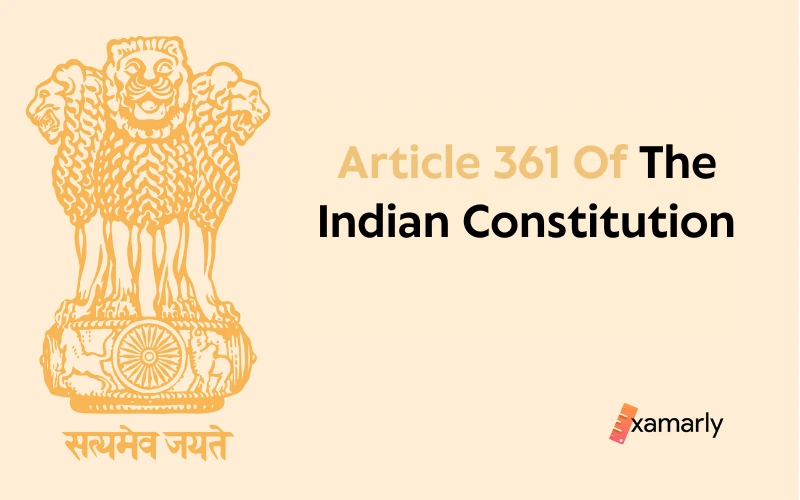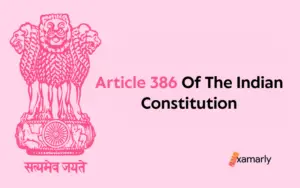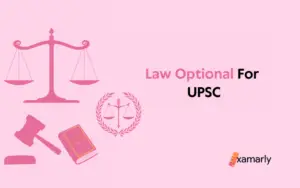The President and Governors of States are crucial figures in the governance of India, with significant powers and responsibilities. But what happens when they are faced with legal proceedings in the discharge of their duties? Article 361 of the Indian Constitution provides legal protections to the President and Governors of States from civil and criminal proceedings.
In this blog, we examine the provisions of this important constitutional article. Apart from the said Article, this page covers Articles 361A and 361B of the Indian Constitution.
- Article 361 Of The Indian Constitution
- Scope Of Article 361(1)
- The Phrase "Purported To Be Done" Has A Significant Amplitude
- Biman Chandra v. Governor, West Bengal (AIR 1952 Calcutta 799)
- G.D.Karkare v. T.L.Shevde (AIR 1952 Nagpur 330)
- Is Article 361 An Exception To Article 14?
- Article 361A Of The Indian Constitution
- When Article 361A Was Inserted?
- Article 361B Of The Indian Constitution
- When Article 361B Was Inserted?
- Conclusion
- FAQs On Articles 361, 361A And 361B
Article 361 Of The Indian Constitution
Presidents and state governors are given protection under Article 361 of the Indian Constitution. Its Constitutional provisions are as follows:
- The President, the Governor, or the Rajpramukh of a State shall not be accountable to any court for the exercise and performance of the powers and duties of their respective offices, nor shall they be answerable for any act done or purporting to be performed by them in the practice and performance of such powers and responsibilities:
Provided, however, that the conduct of the President may be investigated by any court, tribunal, or entity authorized or established by either House of Parliament for the purpose of investigating a charge under Article 61:
Furthermore, nothing in this clause should be interpreted as limiting anyone’s ability to initiate appropriate legal action against the Government of India or the Government of a State. - During their terms of office, neither the President nor the Governor of a State may be the subject of any kind of criminal investigation.
- No court may make an order for the President or any Governor of a State’s arrest or incarceration, during the term of their office.
- No civil proceedings in which remedy is sought against the President or the Governor of a State may be brought in any court during his tenure in office in respect of any act done or purported to be committed by him in his personal capacity, whether before or after he assumed office as President or Governor of such State until the conclusion of two months following written notice. This notice in writing, asserting the purpose of the proceedings, the cause of action therefor, the name, description, and place of abode of the party by whom such proceedings are to be commenced, and the relief which he claims, has been delivered to the President or the Governor, as the instance may be, or left at his office.
Scope Of Article 361(1)
A straightforward reading of the aforementioned Article reveals that the President or the Governor cannot be sued or served with notice since they are not subject to court oversight in the exercise of their official authority. The majority of decisions are made with the Council of Ministers’ guidance and recommendations. The personal immunity from answerability that is guaranteed in Article 361 does not prevent challenges from being brought to the activities that they have taken.
According to the legislation, such activities, including those where a challenge could be made based on accusations of malafides, must be opposed by the Union of India or the State, as the occasion may be. Even in circumstances where personal malfeasance is alleged and confirmed, it would not be permissible for governments to argue that the same cannot be satisfactorily responded to because protection has been granted.
In such a case, it is the respondent’s responsibility to defend the case and convince the court, either by presenting the evidence that is already on file or by providing the affidavit of the individual who is the target of the personal misconduct allegations.
If a person intends to file an affidavit independently, Article 361 does not prohibit that action.
The restriction solely applies to the Court’s ability to give notice or hold the President or Governor accountable.
In light of the fact that the bar exists, the Court is unable to give a directive to either the President or the Governor, even for the filing of an affidavit, in order to assist the Court. It is one thing for someone to voluntarily submit an affidavit, and it is an entirely different thing for the court to order someone to submit an affidavit. Since the personal immunity outlined in Article 361(1) is complete, it is not possible to hold the President or the Governor accountable before the Court for any allegations of wrongdoing.
The Phrase “Purported To Be Done” Has A Significant Amplitude
There is a lot of room for interpretation in the phrase “purported to be done” and can be seen in the following cases:
Biman Chandra v. Governor, West Bengal (AIR 1952 Calcutta 799)
It was determined in the case of Biman Chandra v. Governor, West Bengal [AIR 1952 Calcutta799] that Article 361 grants protection in relation to the exercise and execution of the powers and responsibilities of the office and any act performed or purportedly performed by him in the course of those activities.
G.D.Karkare v. T.L.Shevde (AIR 1952 Nagpur 330)
In G.D. Karakare v. T.L. Shevde [AIR 1952 Nagpur 330], the term “purporting to be done” was interpreted to mean that any act, even one not performed in accordance with the Constitution, may still be given this protection if it professes or claims to do so. Further clarification was provided, stating that even while the Governor does not submit to the court’s process, this does not mean that the High Court cannot review his conduct and issue a remedy in the absence of a decision-making body.
Is Article 361 An Exception To Article 14?
According to Article 14 of the Indian Constitution, no person shall be denied equality before the law or equal protection under the law on Indian territory. All of this boils down to the fact that everyone is treated equally under the law (though equal protection of the law furnishes for affirmative action).
In the Indian Constitution, Article 361 is a provision that deviates from Article 14’s (Right to Equality) mandate. The attributes are listed below.
- For the exercise and fulfillment of the powers and responsibilities of their offices, they are not accountable to any court, according to Article 361, clause 1.
- No criminal procedures may be brought against them while they are in office, according to Article 361(2).
- No arrest warrant or indictment may be issued against them while they are serving in office, according to Article 361(3).
- No civil action against them may be brought without giving at least a two-month notice beforehand, according to Article 361(4).
Article 361A Of The Indian Constitution
The protection of publishing of Parliament and State Legislature proceedings is assured by Article 361A. Its provisions are outlined in the following two clauses:
- No person shall be subject to any proceedings, civil or criminal, in any court in respect to the publication in a newspaper of a basically true report of any proceedings of either House of Parliament or the Legislative Assembly, or, as the case may be, either House of the Legislature, of a State unless it is proven that the publication was made with malice:
With the caveat that nothing in this article shall be applicable to the publication of any report of the proceedings of a secret meeting of the Legislative Assembly, or either House of Parliament, or, as the case may be, either House of the Legislature, of a State. - The preceding clause shall apply, in the same manner as it applies in connection to reports or matters published in a newspaper, in relation to reports or matters aired by means of wireless telegraphy as a component of any program or service given by means of a broadcasting station.
Explanation: In this article, “newspaper” refers to a news agency report that includes content intended for newspaper publishing.
When Article 361A Was Inserted?
The Constitution of India that was enacted in 1950 does not have this Article. It was included as a result of the Constitution (Forty Fourth Amendment) Act, which was passed in 1978.
Article 361B Of The Indian Constitution
The grounds for exclusion from appointment to a political position with remuneration are covered in Article 361B. Provisions of the said Article are as follows:
A member of a House associated with any political party who is disqualified for membership in the House under paragraph 2 of the Tenth Schedule is likewise ineligible to hold any remunerative political position for the time frame on the date of his disqualification and ending on the date on which the tenure of his service as such member expires or the date on which he competes for an election to a House and is certified elected, whichever is sooner.
Explanation. — For the objectives of this article,
(a) “House” has the definition ascribed to it in clause (a) of paragraph 1 of the Tenth Schedule;
(b) “remunerative political post” refers to any office
(i) that is under the control of the Government of India or the State Government, where the salary or pay for such office is paid out of the Public Revenue of the Government of India or the Government of the State, as the situation may be; or
(ii) under the control of an entity, whether incorporated or not, that is completely or partially owned by the Government of India or the State Government, and the wages or remuneration for such seat is paid by such body,
with the exception of cases where the wages or remuneration is compensating in character.
When Article 361B Was Inserted?
This particular provision was not included in the Constitution of India that was enacted in 1950. The Constitution (Ninety First Amendment) Act, which was passed in 2003, is responsible for its incorporation.
Conclusion
To sum up, Article 361, Article 361A, and 361B of the Indian Constitution provide legal protections and transparency in the functioning of the President, Governors of States, and Parliament and state legislative assemblies. The immunity granted to the President and Governors of States under Article 361 protects them from legal proceedings while discharging their duties, while Article 361A ensures the protection of publishing of Parliament and State Legislature proceedings. Article 361B, on the other hand, addresses the grounds for disqualification from appointment to a political post with remuneration. These articles play a vital role in the smooth functioning of the Indian democratic system.
FAQs On Articles 361, 361A And 361B
What Is Clause 1 Of Article 361?
The President, the Governor, or the Rajpramukh of a State are not subject to legal accountability for how they execute and carry out their official duties, nor are they held accountable for any actions they take or allege to take while doing so.
What Is Clause 1 Of Article 361A?
Clause 1 means that if a newspaper publishes a substantially true report of proceedings (such as debates or discussions) that took place in either house of Parliament or in a state legislative assembly, and the report is not proven to have been published with malicious intent, then no legal proceedings can be taken against the newspaper or the person responsible for publishing the report. In other words, the newspaper and the person responsible for publishing the report are protected from civil and criminal proceedings as long as the report is substantially true and not published with malice.
Is Article 361A An Exception To Article 14?
In accordance with Article 14 of the Indian Constitution, no one should be denied equality before the law or equal protection under the law on Indian soil. All people, including citizens and visitors, are granted rights under this provision. However, Article 361A is an Exception to Article 14. According to article 361-A, no individual may be subjected to civil or criminal procedures as a result of publishing any basically true report from the State Legislature or either House of the Parliament.
Is Article 361 Grants Immunity To Governor?
Because of this, the Governor is considered to have absolute immunity or complete immunity under the law. The Governor is not accountable to any court for the way in which he exercises or performs the duties and powers that are entrusted to him, nor is he accountable for any actions or actions that he may have taken or purported to take while doing so. However, the immunity under Article 361(1) does not negate the Court’s ability to review the action’s admissibility, particularly with regard to mala fides.
Which Amendment Has Inserted Article 361B?
91st amendment of the Indian Constitution amended Article 361B.






